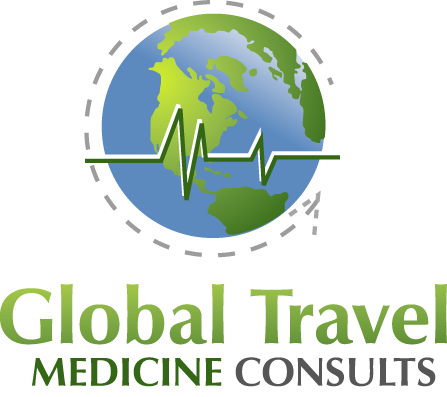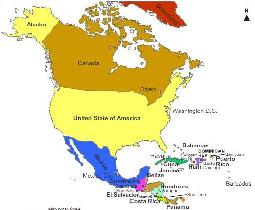Travel Medicine Vaccine and Immunization Information for Countries in North America, The Caribbean, Mexico and Central America
Travel Medicine Immunization and Vaccine requirements in North America, The Caribbean, Mexico and Central America vary from region to region. However, there are some General Guidelines for vaccines such as Tetanus, Pertussis, Mumps, and Hepatitis B, Haemophilus Influenza Type B (HIB), and other vaccines which are outlined below.
Please Click on the Links below for each individual country you will be traveling in within North America, the Caribbean, Mexico and Central America to view the specific travel medicine recomendations and requirements:
North America
Caribbean
Mexico and Central America
General Health Information for Travelers to North America, including Canada, St. Pierre and Miquelon [France], United States [including Hawaii]
Disease Risks, United States and Canada:
In 1994, an international commission certified the eradication of endemic Wild Poliovirus from the Americas. Ongoing surveillance in formerly endemic Central and South American countries (Tropical and Sub Tropical) confirms that poliovirus transmission remains interrupted.
The incidence of communicable diseases is such that they are unlikely to prove a hazard for international travelers greater than that found in their own country. There are, of course, health risks, but in general, the precautions required are minimal.
Certain diseases occasionally occur, such as Plague and Rabies in wildlife, including bats, raccoons, foxes, and other wild animals. Rocky Mountain Spotted Fever, Tularemia,arthropod-borne Encephalitis, and seasonal outbreaks of Influenza. Coccidioidomycosis is endemic in southwestern United States and can occur in visitors to the area. Histoplasmosis is highly endemic, especially in the Mississippi, Ohio, and the St. Lawrence River valleys.
Rodent-borne Hantavirus Pulmonary Syndrome has been identified, predominantly in the western states of the United States. Lyme Disease is endemic in the northeastern United States, Mid-Atlantic, and the upper Midwest and the southwestern provinces of Canada. Occasional cases have been reported from the Pacific Northwest. Recently, cases of West Nile virus have occurred throughout North America. During recent years, the incidence of certain foodborne diseases, e.g., E. coli O157:H7 and Salmonellosis, has increased in some regions. Although the risk of Hepatitis A infection is considered low in the United States and Canada, outbreaks have occurred in some areas. Other hazards include poisonous snakes , Poison Ivy, and Poison Oak. In the north, a serious hazard is the very low temperature in the winter.
In the United States, proof of immunization against Diphtheria, Measles, Poliomyelitis, and Rubella is now universally required for entry into school. In addition, the school entry requirements of most states include immunization against Tetanus (49 states), Pertussis (44 states), Mumps (46 states), and Hepatitis B (26 states). Haemophilus Influenzae Type B (HIB) vaccine is not required for school entry but is required in 49 states for attendance in day care facilities. Because the incidence of reported Hepatitis A is substantially higher in 11 states, mostly in the west, some states now require hepatitis A vaccination for school or day care entry.
Isolated cases of Bovine Spongiform Encephalopathy (BSE/Mad Cow Disease) have been reported in Canada and the United States.
General Health Information for Travelers to Countries in The Caribbean, Mexico and Central America
Recommended Vaccinations and Preventive Medications: The following vaccines may be recommended for your travel to The Caribbean, Mexico and Central America.
* Hepatitis A or immune globulin (IG).
* Hepatitis B, especially if you might be exposed to blood or body fluids (for example, health-care workers), have sexual contact with the local population, or be exposed through medical treatment.
* Malaria: your risk of malaria may be high in some of the countries in these regions.
* Rabies, if you might have extensive unprotected outdoor exposure in rural areas, such as might occur during camping, hiking, or bicycling, or engaging in certain occupational activities.
* Typhoidparticularly if you are visiting developing countries in this region. Typhoid fever can be contracted through contaminated drinking water or food, or by eating food or drinking beverages that have been handled by a person who is infected. Large outbreaks are most often related to fecal contamination of water supplies or foods sold by street vendors.
* Yellow Fever, a viral disease that occurs primarily in sub-Saharan Africa and tropical South America, is transmitted to humans through the bite of infected mosquitoes. The virus is also present in Panama and Trinidad and Tobago. Yellow fever vaccination is recommended for travelers to endemic areas and may be required to cross certain international borders Vaccination should be given 10 days before travel and at 10 year intervals if there is on-going risk.
* As needed, booster doses for Tetanus-Diphtheria and Measles.
Required Vaccinations:
* For detailed information, see the nearest authorized yellow fever vaccine center.
Diseases found in the Caribbean, Mexico and Central America (risk can vary by country and region within a country; quality of in-country surveillance also varies)
The preventive measures you need to take while traveling in the Caribbean, Mexico and Central America depend on the areas you visit and the length of time you stay. You should observe the precautions listed in this document in most areas of this region.
Malaria:
Malaria is always a serious disease and may be a deadly illness. Humans get Malaria from the bite of a mosquito infected with the parasite. Prevent this serious disease by seeing your health care provider for a prescription antimalarial drug and by protecting yourself against mosquito bites.
The Caribbean:
All travelers to malaria-risk areas in Haiti and the Dominican Republic, including infants, children, and former residents of these islands, should take an antimalarial drug. All travelers to Haiti are at risk for malaria, except no risk in the cruise port of Labadee (Labadie).
Travelers to rural areas of the Dominican Republic are at risk for malaria, with the highest risk in provinces bordering Haiti. In addition, risk in all areas of La Altagracia Province, including Punta Cana and Bavaro Beach Travelers to malaria-risk areas in Haiti and Dominican Republic.
There is no risk of Malaria in for malaria in: Anguilla (U.K.), Antigua & Barbuda, Bahamas, Barbados, Bermuda (U.K.), Cayman Islands (U.K.), Cuba, Dominica, Grenada, Guadeloupe, Martinique (France), Montserrat (U.K.), Netherlands Antilles, Puerto Rico (U.S.), St. Kitts & Nevis, St. Lucia, St. Vincent & the Grenadines, Trinidad & Tobago, Turks & Caicos (U.K.), Virgin Islands (U.K., U.S.).
Mexico and Central America:
Your risk of malaria may be high in these countries, including some cities. Travelers to malaria-risk areas, including infants, children, and former residents of Mexico and Central America, should take an antimalarial drug.
Yellow Fever:
The Caribbean:
Yellow Fever is present only in Trinidad & Tobago in this region. A certificate of Yellow Fever Vaccination may be required for entry into certain countries in the region if you have visited Trinidad & Tobago or an endemic area in South America or sub-Saharan Africa.
Mexico and Central America:
Yellow Fever is present only in Panama in this region. A certificate of Yellow Fever vaccination may be requiredfor entry into certain countries in the region if you have visited Panama, Trinidad & Tobago, or an endemic area in South America or sub-Saharan Africa.
Food and Waterborne Diseases:
Make sure your food and drinking water are safe. Food and waterborne diseases are the primary cause of illness in travelers. Travelers' Diarrhea can be caused by viruses, bacteria, or parasites, which are found throughout the Caribbean, Mexico and Central America and can contaminate food or water. Infections may cause diarrhea and vomiting (E. Coli, Salmonella, Cholera, and Parasites), fever (Typhoid Fever and Toxoplasmosis), or liver damage (Hepatitis).
The Caribbean:
Illness caused by a parasitic worm (Angiostrongylus Cantonensis) can occur in this region. People can get infected by eating raw or undercooked snails or slugs that are infected with the parasite.
Mexico and Central America:
Gnathostomiasis (Roundworms) has increased in Mexico, with many cases being reported from the Acapulco area, infection has been reported in travelers. Humans become infected by eating undercooked fish or poultry, or reportedly by drinking contaminated water.
Other Disease Risks:
The Caribbean:
Dengue is transmitted by mosquitoes in this region. Protecting yourself against insect bites will help to prevent this disease.
Cutaneous Larval Migrans is a risk for travelers with exposures on beaches and Leptospirosis is present. Eosinophilic Meningitis caused by Angiostongylus cantonensis occurred in travelers to Jamaica. Anthrax occurs in Haiti. Other infections that tend to occur more often in longer-term travelers (or immigrants from this region) include Lymphatic Filariasis(Dominican Republic and Haiti), Cutaneous Leishmaniais (Dominican Republic), Tuberculosis (Haiti), HIV (Haiti), and Hepatitis B (Haiti and the Dominican Republic). There remains very limited risk of Schistosomiasis in few areas. Other hazards for travelers include Toxic Fish Poisoning.
Mexico and Central America:
Dengue, Filariasis, Leishmaniasis, Onchocerciasis, and American Trypanosomiasis (Chagas Disease) are diseases carried by insects that also occur in this region. Myiasis (Botfly) is endemic in Central America. Protecting yourself against insect bites will help to prevent these diseases.
About Us:
We are Travel Medicine Board Certified Physicians and Doctors. We provide: Yellow Fever, Typhoid, Hepatitis A, Hepatitis B, Diphteria, Tetanus, Pertussis, Meningitis, Hemophilus B, Rabies, Japanese Encephalitis Virus, Mumps Measles and Rubella (MMR), HPV (Gardasil), Rota Virus, Varicella, Polio and Influenza Vaccines to Residents of Washington DC, Maryland and Virginia.
Our Vaccines Clinic is located in the Washington DC Metro area.








